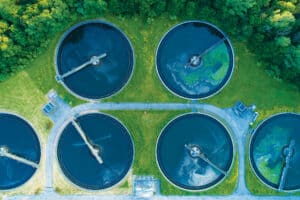
Without enough sewage treatment capacity, little new housing will be built on Cape Cod despite skyrocketing rents and home sale prices.
Cape Cod’s housing woes run much deeper, literally, than the problems facing other communities across the state.
Nearly every town and city in eastern Massachusetts – and increasingly in Central and Western Massachusetts as well – is facing housing shortages and affordability challenges as real estate prices skyrocket and construction of new dwellings is stymied by a thicket of zoning restrictions and local opposition to new developments.
But Cape Cod, where year-round residents are getting priced out of the market and where summer seasonal workers can’t find affordable housing, the problem is compounded by wastewater pollution tied to inadequate septic tank systems and lack of sewer lines running through the peninsula’s sandy, porous soil.
Even if Cape residents and town officials suddenly embraced significant construction of new housing, as Hyannis residents are exploring via a just-launched rezoning process, it’s doubtful much new housing can be built until the Cape’s wastewater problems are solved, according to business leaders, environmental advocates and government officials.
“Wastewater is the biggest factor in trying to solve the problem of housing on the Cape,” said Paul Niedzwiecki, chief executive of the Cape Cod Chamber of Commerce. “You can’t really do dense [housing] right now until this wastewater problem is resolved.”
The good news: There seems to be a growing consensus that the wastewater crisis needs addressing ASAP, as a result of nitrogen and phosphorus pollutants seeping into the Cape’s ponds, bays and other waterways, leaving behind patches of “smelly, green slime,” otherwise known as algae.
The bad news: There’s no consensus on the exact approach and pace of implementing solutions to the wastewater crisis that many believe now poses a direct threat to the Cape’s overall tourism-based economy, not just a threat to the Cape’s environment and housing market. The cost of upgrading tens of thousands of septic tanks and building new local sewer lines and treatment plants has been estimated at anywhere from $2 billion to $6 billion.
CLF Sues Towns, State
Fed up with what it considers a slow pace of planning and action by Cape officials, Conservation Law Foundation, which has been battling federal, state and local authorities in the courts over the wastewater question for years, filed a lawsuit earlier this summer against the state Department of Environmental Protection and city of Barnstable and the town of Mashpee for failure to protect coastal waters from wastewater pollutants.
The suit seeks to suspend installation of any new septic systems in the two towns – and also demands the towns to submit a comprehensive plan to replace existing polluting septic systems.
While specifically targeting just two municipalities, many see the CLF suit as a legal shot across the bow of most other Cape communities now struggling with their own wastewater issues.
Chris Kilian, an attorney at Conservation Law Foundation, said the suit is merely asking the courts to force communities to comply with existing state water-protection laws.
“The wastewater problem has been increasingly apparent over the past 25 years, if not longer,” Kilian say. “This has been one of those slow-motion crises that people have known about for a long time.”
He said the technology already exists to upgrade septic systems so that they don’t leech harmful pollutants into waterways.
“The primary purpose of lawsuit is to end the madness,” he said. “This is a solvable problem.”

Conservation Law Foundation has sued state officials and the municipalities of Barnstable and Mashpee over what it claims is insufficient action to address groundwater polluted by out-of-date septic systems.
Critics: Lawsuit Pushes Bad Fix
Though agreeing the wastewater crisis needs addressing, critics have blasted the CLF suit for pushing a solution – upgraded and more expensive septic systems – that addresses only the nitrogen problem of wastewater, not the phosphorus problem. An upgraded septic system for an average home is estimated to cost about $15,000 more than traditional septic tanks, according to officials.
Critics add that the CLF suit is needlessly antagonizing and angering people across the Cape, as town officials struggle to reach a consensus on how best to move forward on the wastewater issue.
“The chamber is concerned about the unintended consequences of the suit,” said Niedzwiecki. “The suit may spur critics to call for delays. It may create a pause in momentum to [implement] solutions.”
Kristy Senatori, executive director of the Cape Cod Commission regional planning agency, said she couldn’t talk about the merits of the CLF suit. But she noted that some towns are already taking aggressive action on the wastewater front.
She noted that, via the state’s 2018 Cape Cod and Islands Protection Act, area communities now have the authority to levy taxes on short-term rentals, with revenue going into a special fund to address wastewater problems. The fund has distributed about $73 million for wastewater projects so far this year, she said.
“The towns are taking action – and we want to make sure they continue to take action,” said Senatori, adding there’s “no one solution” to combating wastewater pollutants.
Federal Funds May Help
Chris Flanagan, executive director of the Home Builders and Remodelers Association of Cape Cod, said he’s optimistic that the pace of action on the wastewater front will pick up soon, thanks to the flow of millions of federal dollars into town coffers via pandemic-relief programs.
“It’s a rarity we haven’t seen in decades,” Flanagan said of the funds now available for a wide range of infrastructure projects.
Michael Leon, an environmental and real estate attorney at Nutter McClennen & Fish LLP, agreed that towns on the Cape are starting to take action to address the wastewater crisis, such Falmouth, which currently has a wastewater collection and treatment system in place.
Orleans, Chatham and Harwich are also moving forward with plans for new sewer and treatment systems in sensitive areas near waterways, he said.
Most people agree that a final solution to the Cape’s wastewater crisis will be a combination of septic tank upgrades and new sewer lines, Leon and others agree.
But assuming the wastewater problem is somehow solved in coming years, or decades, some are wondering if it will really lead to more dense housing on Cape Cod, regardless of the state’s new Housing Choice zoning reforms, which make it easier for towns to permit housing construction. Many local residents will still oppose new housing for traffic, aesthetic and other reasons, Leon noted.
Then there’s the lack of available and affordable land on which to build more housing on the Cape, he noted.
“The challenges on the Cape are so great,” he said. “You have all these challenges in addition to the wastewater issue.”




 |
| 


